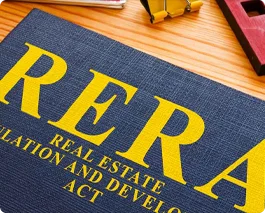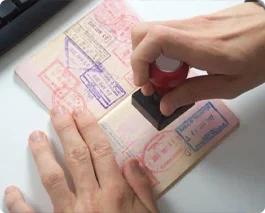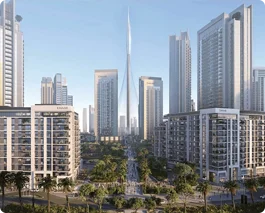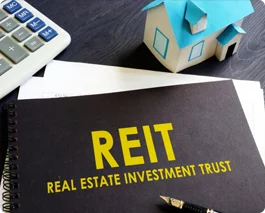Real Estate Regulatory Reforms in Dubai for Investors and End Users: Explained
Dubai’s real estate industry has been an important component of the city’s economic development, attracting domestic and international investors.
The Dubai property market has initiated several regulatory reforms to create a more transparent, stable, and investor-friendly environment, realizing the importance of a well-regulated real estate market. These reforms are necessary for protecting the interests of investors and end users and supporting the real estate market's long-term growth.



The objectives of these regulatory measures involve guaranteeing accountability, improving market stability, expediting approval processes, and supporting sustainable development practices.
The following are some of the significant initiatives and reforms:
Real Estate Regulatory Authority (RERA):
RERA is in charge of regulating Dubai’s real estate sector. It has enacted several regulations to protect the interests of both buyers and sellers. RERA promotes transparency by establishing regulations and standards for the industry of real estate.

Long-Term Visas:
Dubai made it simpler for foreign investors and qualified individuals to live and work in the emirate by introducing long-term visas for investors and skilled workers. These visas were created to give better security and stability to investors.

Ownership Rights:
The Dubai government permits foreigners to acquire 100% of the real estate in areas designated as freehold zones. This meant that foreign investors could have ownership of 100% of the property in specific zones without the need for a local sponsor.

Escrow Accounts:
Escrow accounts were made mandatory for real estate transactions. This ensures that funds are maintained in a secure account and are only paid to the seller if certain project milestones are met. It protects both purchasers and investors.

Rent Freeze:
To prevent excessive rental increases, Dubai created a rent cap system. This provided clients with stability and safeguarded them from abrupt price increases.

Affordable Housing Initiatives:
The government carried out initiatives to provide both UAE nationals and expatriates with cost-effective housing options. This was done with the hopes of making homeownership more accessible to a broader variety of people.

Real Estate Investment Trusts (REITs):
Dubai created REITs to encourage more investment in the real estate market. REITs allow investors to own shares in real estate portfolios, making investing in real estate more liquid and diverse.

Blockchain Technology:
In an effort to boost transparency and lower the possibility of fraud in real estate transactions, Dubai has been exploring the use of blockchain technology.

Green Building Initiatives:
Dubai has promoted environmentally friendly and sustainable real estate development. It is encouraged for developers to construct buildings that are energy- and environmentally-efficient.

Most Trending Projects in Dubai for You to Pick.

Investor Protection Measures
Dubai has implemented several measures to protect investors’ rights to increase investor trust. The creation of escrow accounts for project funds reduces the possibility of mismanagement or fund diversion by guaranteeing that the money invested by customers is used only for the intended purpose.
Investors are given more assurance by stricter laws on off-plan transactions, which include required project completion timelines and fines for delays. Comprehensive disclosure rules for developers contribute to increased transparency in real estate transactions by empowering buyers to make educated choices.

Streamlining Approval Processes
The regulatory procedures associated with acquiring permissions and licenses used to be a source of stress for Dubai investors. To address these challenges, real estate regulatory reforms in Dubai prioritize a simple and accelerated processing of approval procedures.
A single-window clearance system centralizes the approval process, eliminating delays and administrative complications. This not only makes doing business easier but also supports Dubai's reputation as a business-friendly city, attracting additional investors to the flourishing real estate market.

Investor Reforms
Dubai’s real estate regulations are the foundation of the real estate sector, defining the legal framework in which investors and end users operate. These regulations cover a wide range of topics, from property ownership and registration to tenancy real estate legislation and building standards.
The city's continual commitment to improving and updating these Investor reforms is seen in its responsiveness to the changing needs of the real estate market. These regulations lay a clear and organized foundation for real estate transactions while also demonstrating Dubai's commitment to a transparent and accountable property market. The previously discussed regulatory reforms are closely tied to the broader context of Dubai's real estate regulations, with each reform adding to the overall improvement of the regulatory landscape.

End User Policies
Dubai’s real estate regulation reforms include a significant value on end-user policies to protect the rights and interests of individuals who want to live in or use the properties. The use of standardized lease contracts and fair rent index regulations aims to offer clarity and fairness in the rental market,

Real estate regulatory reforms in Dubai
Real estate regulatory reforms in Dubai are part of a deliberate initiative to make the city a more appealing and sustainable destination for investors and end users alike.
The holistic approach addresses critical issues such as investor protection, market stability, efficient processes, and sustainability, promoting an atmosphere that balances growth and accountability. As Dubai develops as a global business and tourism hub, these reforms will play an important role in establishing a real estate landscape that is not only resilient and transparent but also conforms to international standards. The focus on continuous evaluation and improvement demonstrates Dubai's commitment to sustaining a vibrant and dynamic real estate market that serves the best interests of its stakeholders.

FAQs
Recent regulatory reforms in Dubai's real estate sector include changes to property ownership rules, visa regulations, and laws aimed at enhancing market transparency.
The regulatory changes may impact property ownership for international investors by easing restrictions, revising eligibility criteria, and allowing for increased ownership percentages.
Yes, regulatory reforms include initiatives to improve transparency, such as increased disclosure requirements and the use of advanced technology for more accessible information.
The regulatory changes may impact tenancy laws, enhancing tenant rights and providing clearer guidelines for resolving disputes between landlords and tenants.
Regulatory reforms may have streamlined or modified the property registration process, making it more efficient for investors and reducing potential hurdles.
Yes, emerging opportunities in certain real estate sectors may result from regulatory reforms, such as the promotion of affordable housing, sustainable development, or technology-driven solutions.
Stay informed about ongoing and upcoming regulatory changes through government announcements, official websites, and industry publications for reliable information.
Adil Adil
Share This Post
Found this information useful? Share it with your friends and family!
Leave your information so that our expert can consult you in the best way possible
Share your details for personalized expert guidance – let us assist you in the most effective way!
Head Office
Supreme Court Complex – 5 – 1st Floor – Office No: 112 Riyadh St – Umm Hurair 2 – Umm Hurair 1 – Dubai
Email:Info@apilproperties.com
Landline: +97145516626
Whatsapp: +971509026757
- Shall we call you back?
Head Office
Boulevard Plaza, Tower 1 – Suite 1102 – Downtown Dubai
Email:admin@offplan.apilproperties.com
Landline: +97145516626
Whatsapp: +971509026757
- Shall we call you back?
